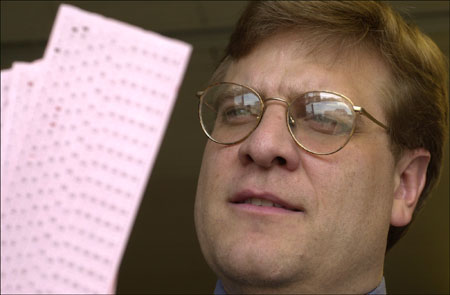Casting a vote for election reform
David King asks: Is D.C. ready?

In the wake of six long weeks this fall filled with hanging chads, ballot recounts, and court challenges, it appears the American people may finally be willing to embrace major changes in the way we elect our government leaders. The question is, Is Washington ready? David King, associate professor in public policy at the Kennedy School of Government (KSG), is anxious to find out.
King chairs the task force on election administration with the National Commission on Federal Election Reform. The commission, which is privately funded and overseen by former Presidents Gerald Ford and Jimmy Carter, was unveiled in Washington, D.C., last week.
“The election in November laid bare to everyone that there is an administrative crisis in the way that elections are run, and the problems need to be solved. … The legitimacy of our democracy is in question especially for young people,” King says. “What we needed was a high-level national commission that could look at the problem of elections with a clean sheet of paper, without any partisan bias.”
The commission promises to do just that. Its co-chairmen are former Tennessee Sen. Howard Baker, a Republican, and former White House Counsel Lloyd Cutler, a Democrat. Its executive director is Philip Zelikow of the University of Virginia’s Miller Center of Public Affairs.
“Everything is balanced with the hope of giving recommendations to Congress about legislation that can be passed in the next year, if possible, to affect the congressional elections in 2002,” King explains. “Our work has already begun.”
In fact, King says, the work actually began late last year at the Kennedy School.
“On Dec. 12, we held a public forum that carried onto a private meeting, organized by the Institute of Politics (IOP) and KSG Dean Joe Nye, funded by the Dean’s Initiative,” King says. “That was the first postelection gathering of election administrators from around the country, practitioners who really know how things operate … and that has grown into the task force on election administration for the national commission.”
The commission is exploring a number of areas that impact how people vote, how ballots are tabulated, and how poll workers are trained.
“We are looking at those fundamental problems of election administration — from a lack of understanding of how ballots should be designed and disseminated to the public, maintenance of election machines, and the safety and supervision of local election officials. There are a tremendous number of problems at every level.”
Identifying the problems is easy, King believes, but specifying solutions is not.
For instance, when considering ballot design, the commission will weigh the advantages and disadvantages of punch cards (currently used by one-third of American voters), optical scans, and intranet systems. Each of them has their advocates and their critics. Some are more error-prone than others. Then, there’s the question of cost.
“Many counties are now moving to optical scan systems,” King says. “But the pricing structure is very deceptive … The big cost of an optical scan system is not in the machine, but in the paper you have to feed into the machine.”
The commission is also grappling with the question of moving Election Day or adjusting polling hours in hopes of increasing voter participation. Some want an election holiday to allow people to vote on their day off. Others suggest uniform poll closing times to discourage television network projections from affecting the outcome. “All of these issues are on the table,” King says.
Lawmakers, experts, and community leaders throughout the country will have the opportunity to add their input on the issues during a series of public meetings. The first will be held later this month at the Carter Center in Georgia. Subsequent hearings are scheduled for the Ford Library in Michigan, the Johnson Library in Texas, and the Reagan Library in California.
After soliciting public input, the commission will produce a set of recommendations to be forwarded to members of Congress and the White House before the end of the calendar year. While there are no guarantees the recommendations will be implemented, King believes there is a greater chance of action if federal and local officials can work together.
“There is a trade-off between standardization of ballots and machines and the need to support innovation that happens at the local level,” King explains. “If we have a highly decentralized system it creates the atmosphere for a lot of innovation, but also if there’s a lack of oversight it creates the kind of situation we faced in November and December.
“If, on the other hand, we go to the other extreme and regulate completely at the federal level with national ballots and standardized machines across the country, we stifle innovation. Getting that balance right is very important.”
It is also important, King believes, to learn from the mistakes of the past when crafting a vision for the future.
“Voting is habit-forming, but not voting is also habit-forming, and we are on the verge of losing another generation to not voting. Did the last election make them say ‘My vote counts?’ No, they’re even more cynical now because of the way the election was run,” King says. “It’s important that the faith in elections be restored, and I don’t think that’s a terribly difficult task. Most of the problems are completely solvable.”
Solvable, perhaps, but can there be a perfect election system?
“There will be a far better system,” King says. “We can’t let perfect get in the way of good.”




